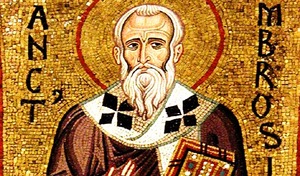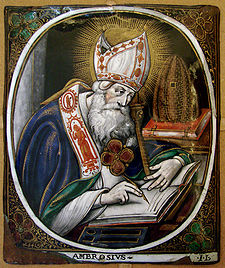| Whether you are an Eastern Christian or a Western Christian, it is said that we are at mid-lent. The intensity of prayer, fasting and almsgiving ramps up to discipline or body, mind and soul in preparation to receive the graces of Holy Week and then Easter. The following text from Saint Ambrose, Bishop and Doctor of the Church, will give us perspective thus helping us to reflect upon our spiritual journey thus far. Many of us will weaken in our lenten observance. But don’t that happen. There is much at stake. |
| St Ambrose’s preaching: Give thanks, Brethren, to the Divine Mercy which has brought you safely halfway through the season of Lent. For this favor they give praise to God, thankfully and with devotion, who in these days have striven to live in the manner which they were instructed at the beginning of Lent; that is, those who, coming with eagerness to the Church, have sought with sighs and tears, in daily fasting and almsdeeds, to obtain the forgiveness of their sins. They, however, who have neglected this duty, that is to say, those who have not fasted daily, or given alms, or those who were indifferent or unmoved in prayer, they have no reason to rejoice, but rather, unhappy that they are, for mourning. Yet let them not mourn as if they had no hope; for He Who could give back sight to the blind from birth (cf. Jn 9), can likewise change those who now are lukewarm and indifferent into souls fervent and zealous in His service, if with their whole heart they desire to be converted unto Him. Let such persons acknowledge their own blindness of heart, and let them draw near to the Divine Physician that they may be restored to sight. Would that you might seek the medicine of the soul when you have sinned, as you seek that of the body when you are ill in the flesh. Who now in this so great assembly were he condemned, not to be put to death, but to be deprived of his sight only, would not give all he possessed to escape the danger? And if you so fear the death of the flesh, what do you not fear more than the death of the spirit, especially since the pains of death, that is, of the body, are but of an hour, whilst the death of the soul, that is, its punishment and its grieving, has no end? And if you love the eyes of your body, that you soon will lose in death, why do you not love those eyes of the soul by which you may see your Lord and your God forever? Labor therefore, Beloved Children in the Lord, labor while it is yet day; for as Christ Our Lord says, The night cometh, when no man can work (Jn 4:4). Daytime is this present life; night is death, and the time that follows death. If after this life there is no more freedom to work, as the Truth tells us, why then does every man not labor while he yet lives in this world? Be fearful, Brethren, of this death, of which the Savior says: The night cometh, when no man can work. All those who now work evil are without fear of this death, and because of this, when they depart from this life they shall encounter everlasting death. Labor while yet ye live, and particularly in these days; fasting from delicate fare, withholding yourselves at all time from evil works. For those that abstain from food, but do not withhold themselves from wickedness, are like to the devil, who while he eats not, yet never ceases from evildoing. And lastly, you must know that what you deny yourself in fasting, you must give to heaven in the poor. Fulfill in work, Brethren, the lesson of this day… lest there come upon you the chastisement of the Jews. For they said to the blind man: Be thou his disciple (Jn 9:28). What does being a disciple of Christ mean if not to be an imitator of His compassion, and a follower of His truth and humility? But they said this meaning to curse the man. Instead it is a truly great blessing, to which you may also attain, by His grace Who liveth and reigneth unto ages of ages. Amen. |
| God invites us today to recommit ourselves to the disciplines of this holy season. Keep in mind, the end of our journey is in sight: the feast of the Holy Resurrection –Pascha – Easter. |
Tag: St Ambrose
St Ambrose –the saint we need, and want
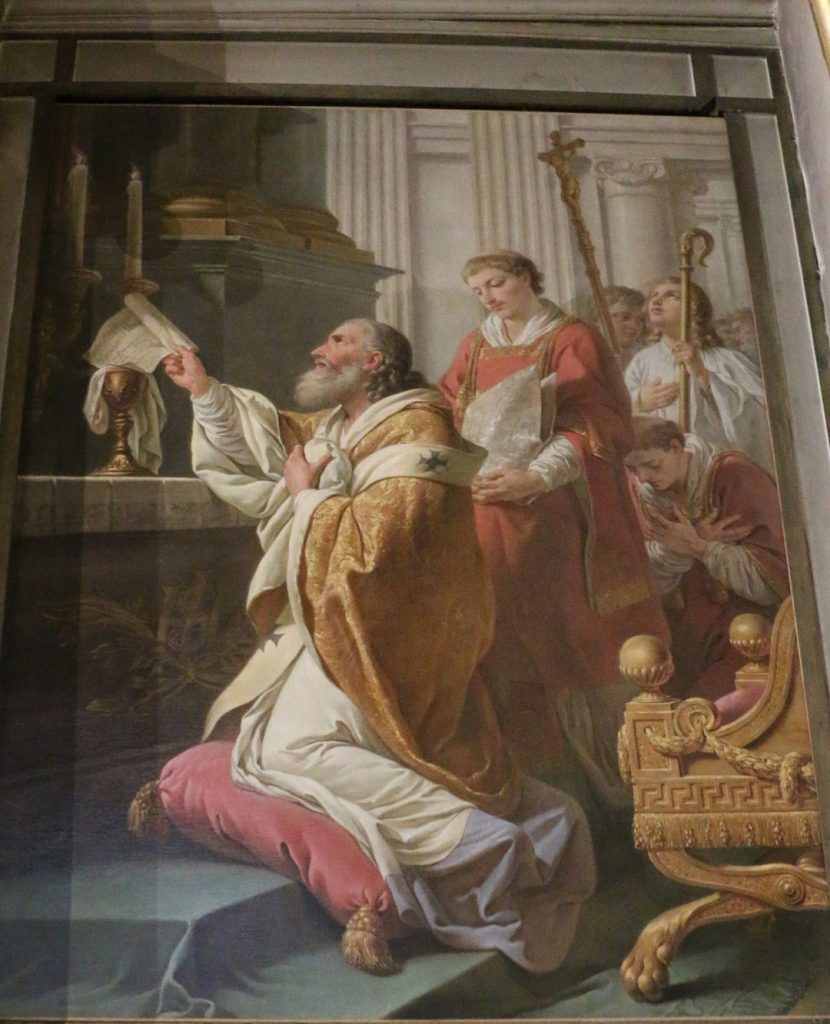
We have the liturgical memorial of Saint Ambrose, bishop, confessor and doctor of the Church.
Ambrose is quite an interesting person and one we ought to think about more often. His personal history is daunting to wrap the mind around: a convert, a motivating speaker, a provocative thinker, a reformer of civil and ecclesiastical works, an author, a composer (the Te Deum), a zealous preacher and valiant defender of the Christian Faith, a worker of miracles, a man of virtue, and a man of the people. He is the saint the Holy Trinity has given us, he is the saint I want and the one I need.
As said before in this forum that saints beget saints, one great example is that Ambrose baptized Augustine.
He was fast-tracked to the ministry of bishop. I merely point this fact out because he was acclaimed to be bishop of Milan prior to be baptized. One biographer noted that “He accepted holy Baptism from an Orthodox priest and, passing through all the ranks of the Church clergy in just seven days, on December 7, 374 he was consecrated Bishop of Mediolanum [Milan].” Today’s feast, hence, doesn’t commemorate a saint’s death as most often happens saint’s memorials, but Ambrose’s feast is on the day he was consecrated to the episcopal order.
Reading up on St Ambrose I realized that I hope this happens to me: St Ambrose, who departed to the Lord on the night of Holy Pascha. What better day than to make one’s transitus to the Lord of Life than that of the day we celebrate Easter! His death on Pascha encapsulated all that he believed, preacher and loved.
The Church’s liturgical hymns are key in our forming our own theological heart and mind. Below the Troparion and Kontakion tells us what the faithful and the magisterial church believe when thinking of Saint Ambrose.
In truth you were revealed to your flock as a rule of faith,an image of humility and a teacher of abstinence; your humility exalted you; your poverty enriched you.Hierarch Father Ambrose, entreat Christ our God that our souls may be saved. (Troparion)
You shone forth with divine doctrine eclipsing the deception of Arius, shepherd and initiate of the mysteries, Ambrose.you worked miracles through the power of the Spirit, healing various passions; righteous father, entreat Christ our God to grant us His great mercy. (Kontakion)
Today I am praying for two monk-friends named for Ambrose, the Parish of St Ambrose and its pastor in North Branford, Connecticut, the Fraternity of Communion and Liberation whose origins is that of the Diocese of Milan and the Benedictine monks who colonized just outside the City of Milan. AND I am praying for my honey bees and fellow CT beekeepers.
St Ambrose
 Today is the liturgical memorial of the great St. Ambrose of Milan (c. A.D. 340–397).
Today is the liturgical memorial of the great St. Ambrose of Milan (c. A.D. 340–397).
You know the narrative: born in what is now France, a successful lawyer and politician in Milan, Italy; following the death of the bishop of Milan, the people demanded that the catechumen Ambrose and not yet a Christian, become the successor. (Ambrose hid in an attempt to escape the nomination; even the emperor forbade giving him shelter, forcing him to give himself up and submit.)
Ambrose was a holy leader: author of hymns, theology, correct teaching, serving the poor and donating his patrimonial land to the Church, and being available to all. Bishop Ambrose defended orthodox doctrine against the pervasive Arian heresy which denied the divinity of Jesus Christ. As a beekeeper and as one who appreciates and loves liturgical theology, I have an appreciation for Ambrose’s nickname: “honey-tongued doctor.” In fact, one of hives is named for St Ambrose.
Bishop Ambrose introduced lectio divina to his local church: the practice of prayerfully meditating on the Sacred Scriptures. This method of prayer spread all over the Church. You will recall that it was Ambrose as the bishop who converted and baptized St. Augustine of Hippo. He is one of the four original Doctors of the Church, and his statue is one of four that upholds the Chair of St. Peter inside St. Peter’s Basilica in Rome.
Today, prayers for the Fraternity of Communion and Liberation meeting in NYC’s Mother Cabrini Shrine for the Advent Day of Recollection. 40+ are gathering. A fitting day for us since Communion and Liberation was founded in the Diocese of Milan.
St Ambrose
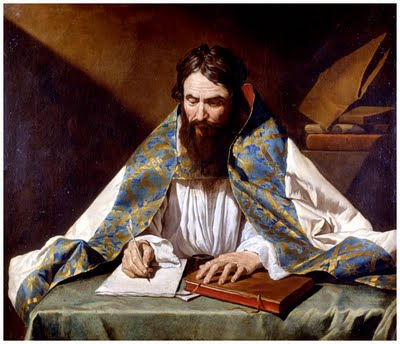 Today is the liturgical memorial of St. Ambrose reputed to be the greatest Archbishop of Milan (at a time it was the center of the Roman Empire). Ambrose was elected bishop when he was still a catechumen who was competent in civil and ecclesial administration but he’s also known for his acumen in theology and hymnody. It is his relationship with the Holy Trinity that orients our attention, especially with regard to the Incarnation. If we don’t get the Incarnation of the Eternal Word of God correct, nothing else in our Catholic life will be correct. In this period of preparation for the Nativity of the Lord, Ambrose sets our meditation in a way no other can.
Today is the liturgical memorial of St. Ambrose reputed to be the greatest Archbishop of Milan (at a time it was the center of the Roman Empire). Ambrose was elected bishop when he was still a catechumen who was competent in civil and ecclesial administration but he’s also known for his acumen in theology and hymnody. It is his relationship with the Holy Trinity that orients our attention, especially with regard to the Incarnation. If we don’t get the Incarnation of the Eternal Word of God correct, nothing else in our Catholic life will be correct. In this period of preparation for the Nativity of the Lord, Ambrose sets our meditation in a way no other can.
He wrote of the Son of God: “And the Word was with God. This that he said is to be understood thus: The Word was just as was the Father; since He was together with the Father, He was also in the Father, and He was always with the Father. […] It is of the Word to be with the Father; it is of the Father to be with the Word, for we read that the Word was with God. So if, according to your opinion, there was a time when He was not, then, according to your opinion, He too was not in the beginning with whom was the Word. For through the Word I hear, through the Word I understand that God was. For, if I shall believe that the Word was eternal, which I do believe, I cannot doubt about the eternity of the Father, whose Son is eternal” (The Sacrament of the Incarnation of our Lord (III, 15-18, from the Vatican web site).
And again, Ambrose says, “He lay in the crib, that you might stand at the altar. He came to earth, that you might come to the stars” (Exposition of Luke 2.41).
St Ambrose
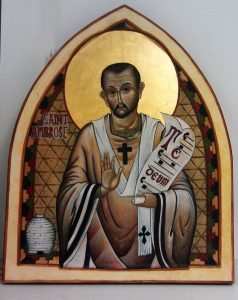 We come today to the feast of the greatest Archbishop of Milan, Saint Ambrose. He served at a time when Milan was the center of the Empire. We know historically that Ambrose was elected bishop when he was still a catechumen (not yet baptized). The faithful had a suspicion that the excellent civil servant would prove to be most competent churchman: in theology and sacred Liturgy, in administration, and a holy and sincere Christian. Saint Benedict recommends his hymns in the Rule and traditionally think that the “Te Deum” hymn is ascribed to him.
We come today to the feast of the greatest Archbishop of Milan, Saint Ambrose. He served at a time when Milan was the center of the Empire. We know historically that Ambrose was elected bishop when he was still a catechumen (not yet baptized). The faithful had a suspicion that the excellent civil servant would prove to be most competent churchman: in theology and sacred Liturgy, in administration, and a holy and sincere Christian. Saint Benedict recommends his hymns in the Rule and traditionally think that the “Te Deum” hymn is ascribed to him.
Born of a noble Roman family in Gaul around the year 340, Ambrose studied in Rome and served the imperial government at Sirmium. In 374, elected bishop of Milan, and ordained on this date. Saint Ambrose died April 4, 397. The Pope proclaimed Saint Ambrose a Doctor of the Church in 1298; he is honored as the patron saint of beekeepers and candle makers, because of the honeyed words of his preaching.
The image here of the saint hangs at Newark Abbey (Newark, NJ).
Ambrose’s civil experience as governor allowed him the skill of knowing how “to talk to power.” When the Emperor Theodosius had 7,000 Thessalonians slaughtered over the assassination of their governor, he excommunicated him for his horrendous crime – and made it stick, bringing Theodosius to repentance.
As a theologian, Bishop Ambrose wrote about the incarnation of the Son of God:
“And the Word was with God . This that he said is to be understood thus: The Word was just as was the Father; since He was together with the Father, He was also in the Father, and He was always with the Father. […] It is of the Word to be with the Father; it is of the Father to be with the Word, for we read that the Word was with God. So if, according to your opinion, there was a time when He was not, then, according to your opinion, He too was not in the beginning with whom was the Word. For through the Word I hear, through the Word I understand that God was. For, if I shall believe that the Word was eternal, which I do believe, I cannot doubt about the eternity of the Father, whose Son is eternal.” (The Sacrament of the Incarnation of our Lord (III, 15-18, from the Vatican web site)
Choice: vanity of owning and being in eternity?
On the 18th Sunday Through the Church year we have been given this gospel: Luke 12:13-21. In part we come to the part of the passage where parable Jesus tells he mentions the demand for the inheritance. As a friend said in his homily, “It is interesting to observe how many times I find myself “give orders” to Jesus! Should it not be the opposite? But even for Jesus, rather than giving an order or even that of judgments or condemnation, He invites me to reflect….”
St. Ambrose offers us this reflection:
“He uselessly accumulates wealth when he does not know how he will use it. He is like him who, when his full barns were bursting from the new harvest, built storehouses for his abundant crops, not knowing for whom he gathered them. The things that are of the world remain in the world, and whatever riches we gather are left to our heirs. The things that we cannot take with us aren’t ours either. Only virtue is the companion of the dead. Compassion alone follows us.”
Saint Ambrose
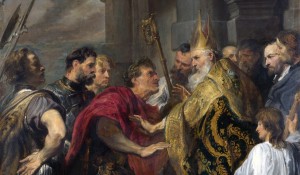 Today, the Church celebrates the feast Saint Ambrose of Milan, who offers us a model of public Christian witness, and he is one of the Church’s great doctors. You know most of the salient points of the person of Ambrose: In A.D. 374 Ambrose became archbishop of Milan, a city taken over by the Arian heresy. Milan was also the residence of one of the Roman co-emperors; this new vocation was forced upon him. The saint quickly embraced an ascetical life, was charitable toward the poor, and reformed the Liturgy of his mammoth diocese; endured hardships, including an assassination attempt ordered by the Western empress herself. Ambrose’s mission was to convert the heretics of his diocese back to belief in the divinity of Christ. What got him elected as the bishop was his fine reputation as an eloquent speaker; later he revealed the talent of being author on Christian doctrine and composer. Many will always credit him for his role in the conversion of Saint Augustine, whom Ambrose baptized in A.D. 387.
Today, the Church celebrates the feast Saint Ambrose of Milan, who offers us a model of public Christian witness, and he is one of the Church’s great doctors. You know most of the salient points of the person of Ambrose: In A.D. 374 Ambrose became archbishop of Milan, a city taken over by the Arian heresy. Milan was also the residence of one of the Roman co-emperors; this new vocation was forced upon him. The saint quickly embraced an ascetical life, was charitable toward the poor, and reformed the Liturgy of his mammoth diocese; endured hardships, including an assassination attempt ordered by the Western empress herself. Ambrose’s mission was to convert the heretics of his diocese back to belief in the divinity of Christ. What got him elected as the bishop was his fine reputation as an eloquent speaker; later he revealed the talent of being author on Christian doctrine and composer. Many will always credit him for his role in the conversion of Saint Augustine, whom Ambrose baptized in A.D. 387.
One of the things that sticks out about Saint Ambrose today is his insistence on being a good churchman, one who doesn’t coddle the people. This quote gives you a sense of what I mean:
For there is this difference between good and bad rulers, that the good love freedom, the bad slavery. And there is nothing in a Bishop so offensive in God’s sight, or so base before men, as not freely to declare his opinions… I prefer then, to have fellowship with your Majesty in good rather than in evil; and therefore the silence of a Bishop ought to be displeasing to your Clemency, and his freedom pleasing. For you will be implicated in the danger of my silence, you will share in the benefits of my outspokenness. I am not then an officious meddler in matters beyond my province, an intruder in the concerns of others, but I comply with my duty, I obey the commandment of our God. This I do chiefly from love and regard to you, and from a wish to preserve your well-being. But if I am not believed, or am forbidden to act on this motive, then in truth I speak from fear of offending God. (Ambrose, Epist. XL.2-3, trans. H. Walford, 1881)
Today, I am praying through the intercession of the holy bishop and doctor of the Church Ambrose for all my friends of Milan.
Saint Ambrose
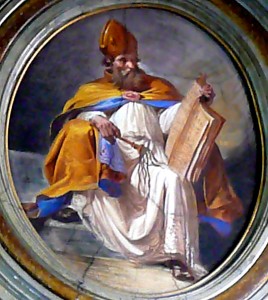 Saint Ambrose is venerated in the Churches of the East and the West. He is a pivotal figure in Church history of sincerity but also because of his clear defense and teaching of the faith, his good administration of the Church and his witness so that others could become saints.
Saint Ambrose is venerated in the Churches of the East and the West. He is a pivotal figure in Church history of sincerity but also because of his clear defense and teaching of the faith, his good administration of the Church and his witness so that others could become saints.
What comes to mind is my own desire to pray for the great Church in Milan, and this feast helps me to remember the missionary work of so many from Milan to other parts of the world. All us are on mission.
One of Ambrose’s gifts was “repacking” church teaching into verse, giving it a melody, and encouraging the people to sing their faith. Singing reinforces what you read and learn. A good example follows (though without music):
Redeemer of the nations, come;
reveal yourself in virgin birth,
the birth which ages all adore,
a wondrous birth, befitting God.
From human will you do not spring,
but from the Spirit of our God;
O Word of God, come; take our flesh
and grow as child in Mary’s womb.
You came forth from the eternal God,
and you returned to that same source.
You suffered death and harrowed hell,
and reigned once more from God’s high throne.
With God the Father you are one,
and one with us in human flesh.
Oh, fill our weak and dying frame
with godly strength which never fails.
You cradle shines with glory’s light;
its splendor pierces all our gloom.
Our faith reflects those radiant beams;
no night shall overcome it now.
All praise, O unbegotten God,
all praise to you, eternal Word,
all praise life-giving Spirit, praise,
all glory to our God Triune.
Mary, the Mother of God is united with the Church, St Ambrose teaches
By reason of the gift and role of divine maternity, by which she is united with her Son, the Redeemer, and with His singular graces and functions, the Blessed Virgin is also intimately united with the Church. As St. Ambrose taught, the Mother of God is a type of the Church in the order of faith, charity and perfect union with Christ. For in the mystery of the Church, which is itself rightly called mother and virgin, the Blessed Virgin stands out in eminent and singular fashion as exemplar both of virgin and mother. By her belief and obedience, not knowing man but overshadowed by the Holy Spirit, as the new Eve she brought forth on earth the very Son of the Father, showing an undefiled faith, not in the word of the ancient serpent, but in that of God’s messenger. The Son whom she brought forth is He whom God placed as the first-born among many brethren, namely the faithful, in whose birth and education she cooperates with a maternal love.
Second Vatican Council
Lumen gentium
Saint Ambrose
O God, who made the Bishop Saint Ambrose a teacher of the Catholic faith and a model of apostolic courage, raise up in your Church men after your own heart to govern her with courage and wisdom.
The prayers for todays Mass that honors the ecclesial memory of one of the famous saints are key to pinpointing what the Church most revers about the man who was concerned about right-thinking and right-praying Christians. Who was Ambrose? The Collects tells us that he was a bishop, saint teacher, model of courage seen in the apostles and capable of good governance, that is, he had courage and wisdom. What moved Ambrose? Again, the collects tell us he was constantly inspired by the light of faith.
The Church recalls Saint Ambrose of Milan (340?-397), bishop and Doctor of the Church. Ambrose was born in Trier to a Roman family: his father was praetorian prefect of Gaul and educated in Rome In about 372 he began his public service as prefect of Liguria and Emilia, whose capital was Milan.
Let’s recall that the ecclesial tradition indicates that the gospel was brought to Milan by Saint Barnabas and that the city’s first bishop was Saint Anathalon. In 374 the bishopric of Milan became vacant. An astute Ambrose tried to work with the conflict between orthodox Catholics and Arians over the appointment of a new bishop. His words were convincing and hopeful that the people demanded –not the pope– that he become the bishop of Milan.
Ambrose’s personal holiness was such that he gave his material belongs to the poor and to the Church. We attentive to the prayerful reading of the Scriptures and praying the Liturgy. He was a very attentive bishop as the Good Shepherd. Works of charity and clear teaching was attractive to many. As bishop he defended the rights of the Church and tried to correct the errors of the Arian heresy with learning, firmness and gentleness.
The Divine Office that we pray today is still peppered with Ambrose’s hymns.
Saints beget saints. Ambrose was central to the conversion of St Augustine to Catholicism.
Pope Benedict gave his own catechesis on this great saint today. Ambrose is the “Icon of Christ.”


